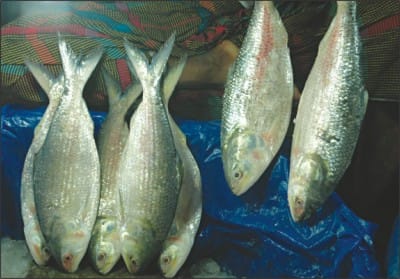Pahela Baishakh cheers up sales

A vendor puts hilsa fish up for sale at Karwan Bazar in Dhaka on the eve of Pahela Baishakh. Businessmen -- big or small -- count brisk sales prior to the Bangla New Year festival. Photo:Shawkat Jamil
Abdur Rahim Sheikh, a fish vendor at Karwan Bazar, sold nearly 800 hilsa fish in the last six days. On the eve of Pahela Baishakh, he was optimistic about sales.
“The sales of hilsa remain good round the year, but at this time, it doubles. Many will begin the day with traditional culinary delights that include fried fish and soaked rice, so they buy hilsa as part of celebrations,” he said.
Sales increased mainly from last week, but the last three days before the festival account for more than half.
He sold hilsa of various sizes and prices ranging between Tk 300 and Tk 2,000 each.
Rahim said the fish traders of Karwan Bazar sold nearly 25,000 hilsas to retailers and wholesalers in the city last week.
He admitted that high demand often raises the prices of the fish at this time.
Not only for fish traders, Pahela Baishakh, Bangla New Year's Day, coloured the horizons of business around the country, with promises of exciting sales prior to the most celebrated event of the country.
Pahela Baishakh is special to businessmen, as traditionally, they open a 'halkhata' or a new book of accounts to update annual sales and dues.
Over the years, Pahela Baishakh has become more a part of domestic and social lives with fairs and other festivities that are enjoyed by people from all religions.
The main programme revolves around the Ramna Batamul, where cultural programmes have been organised for years. Festivities also spread to all over the country and people shop for new clothes and visit fairs and cultural events.
Special offers by boutiques, sari shops, five-star hotels, restaurants, beauty salons, flower shops, telecom operators, radio stations, bakeries and printing houses add glitter to the event.
Sales of several items, including sari, fatua, panjabee and traditional decorative items have increased manifold prior to the festival.
Meghna Mridul, manager of Deshal at Banani, said sari and fatua sales jumped in the last two weeks.
“Since we began our journey in 2005, the boutique has become a hit among the youth, as we display trendy attires at affordable prices,” she said.
Additionally, the sale of jewellery made from glass beads and brass has also increased.
Other renowned boutiques, such as Aarong, Bibiana, Nogordola, Onnomela, Nipun, and Sadakalo, have also launched their collection of saris and other trendy outfits. Many are also offering discounts on several items.
In line with the theme, hand and machine embroidery is used on salwar kameez, fatua and panjabi, said a sales executive at Nogordola.
Renowned sari shops are also expecting brisk sales this festival.
M Shamsul Alam, owner of Taant Kutir at New Market, said the sales of traditional red and white saris jumped before the celebrations.
“We sell more saris on Pahela Baishakh than the two Eids combined, as sari is a must-have item on the day. As Baishakh nears, we often struggle to meet demand for saris,” he said.
Alam sold saris worth Tk 3 lakh on this occasion last year.
Sari sales by Jamdani Kutir, a popular sari shop on Bailey Road, have almost doubled this year than last year. They sold saris worth Tk 5 lakh last year, said Sakur Abedin, who is in charge of the shop.
Most traders at New Market, Dhanmondi Hawkers' Market and Gausia echoed him.
The flower trade is also blossoming with the season. Around 100 vendors near Shahbagh, Kataban and High Court are expecting brisk sales.
Harun Ali, a flower dealer at Shahbagh, said he sold flowers and garlands worth Tk 40,000 on Pahela Baishakh last year.
“Most orders are for garlands, made of different flowers,” he said. Traditionally, garlands complement most hairdos for sari-clad women.
All five-star hotels, including Dhaka Sheraton, Pan-Pacific Sonargaon and Westin Dhaka, have designed special menus, preparing to earn additional revenue on the day.
Pan Pacific Sonargaon hotel organised a three-day festival with Bangladeshi cuisine, cultural show and a colourful bazaar with traditional stalls.
Beauty salons are also geared to serve the band of beauty-conscious women. Top salons, including Persona Hair and Beauty and Farzana Shakil's Makeover Salon will remain open from 6.30 am on Pahela Baishakh.
Apart from these, decorative items made from terracotta, and festive items, like colourful masks made from paper and cane, are also high in demand on the day.
But many handicraft makers are in a glum mood over falling sales. Parimal Das, a dugdugi (hand-drum) maker, counted Tk 5,000 in sales in 2009, down from Tk 12,000 a year ago.
The dugdugi is a type of a percussion instrument shaped like an hourglass, with both ends covered with goatskin, sometimes hard paper. A string with two small lead or iron balls is fastened around the narrow waist of the drum.
“Now many people prefer to buy plastic items, instead of paper made dugdugis,” he said. “Simultaneously, the number of fairs across the country reduced in the last 6-7 years -- another reason behind low sales.”
The advertising industry is also flourishing as private television and radio channels are airing new advertisements from telecom operators, restaurants, beauty salons and boutiques.
Many street vendors near Ramna Batamul and the Dhaka University campus are also expecting to join celebrations with stalls for traditional sweets and clay dolls.

 For all latest news, follow The Daily Star's Google News channel.
For all latest news, follow The Daily Star's Google News channel. 



Comments